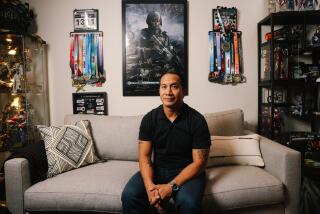The Cutting Edge: COMPUTING / TECHNOLOGY / INNOVATION : Yo, Dude! Here’s Your Dream Video Job : Software: Game testers get paid to play, but the job is more rigorous than it looks.
- Share via
REDWOOD CITY, Calif. — Todd Morgan used to make his living tending bar at a fancy Silicon Valley restaurant. But by day he indulged his real passion: playing video games.
Morgan is something of a fanatic. Just for fun, he’d spend hours at the TV, clipboard at his side, taking notes on how games could be improved. The machines he has mastered comprise a nearly complete history of video gaming.
“Let’s see, I started with Pong, then there was the Atari Intelivision--never got to Coleco--I got the first Nintendo and, of course, there’s the Sega,” the 25-year-old Morgan recalls wistfully.
But Morgan doesn’t have to tear himself away from the TV to tend bar anymore. He has landed his dream job: video game tester for Sega of America.
Morgan is one of 120 testers, crammed two to a cubicle, in the company’s testing center here. Adorned with Jimi Hendrix and Charles Barkley posters and calendars with bikini-clad girls--and peopled with youths in baggy jeans and flannel shirts and spiky, fluorescent hair--it looks more like a college dormitory than a corporate office.
But make no mistake: testing is a crucial component of the product development process for video game and computer software vendors, especially now that consumers are beginning to rebel over software bugs. And the job of the tester is quite a bit more rigorous than it appears.
Michael Weiner, at 33 something of an old man in this world, is responsible for recruiting and riding herd on the motley crew of testers. His criteria for job applicants are fairly simple: “We’re not so much looking for any particular academic background when we hire them,” he says. “What we’re looking for are gamers.”
In the parlance of the video game subculture, gamers are the hard core, those who will play a game again and again and again and again until it has been mastered. A real gamer doesn’t throw up his hands when faced with a particularly tough game, but rather digs in for more.
How does Weiner separate the real gamers from the dabblers?
“I’ll ask them questions like, ‘Have you played an RPG?’ If they answer, ‘What’s that?’ that’s a bad thing,” Weiner says. An “RPG” in the language of video games means a “role playing game.”
“I’ll ask them, ‘Have you ever found a bug?’ ” Weiner continues. “If you’re a real gamer, you should have found a bug. My 5-year-old son can identify a bug.”
Weiner then has applicants write two essays: “Why I would be a good video game tester” and “What is my favorite game, why it’s my favorite and how it can be improved.”
“You also need to have good communications skills,” Weiner explains. “If you don’t, you might be able to find a problem but not be able to describe it.”
Lest anyone think that game testers are slackers who zone out in front of the TV screen, Weiner and his troops are quick to set the record straight. The first shift of testers arrive at 7 a.m. and are relieved by the second shift at 3 p.m. The second shift is scheduled until 11 p.m., but they often stay until 1 or 2 in the morning. “I tell them no more than 16 hours straight,” Weiner says. “It’s not that I mind paying double-time, it’s that they’re just not productive after a certain amount of time.”
But in the fall, when Sega prepares to launch Christmas titles, none of the rules apply: Game testers often put in all-nighters fueled on Jolt cola and Domino’s Pizza.
Even for a gamer, some of the assignments can be tedious. “With the preschool games, after awhile the soundtrack can drive you crazy,” says David Dodge, 27. Weiner often assigns children’s games as punishment to employees who have been “acting up.”
Games usually spend about 10 days in testing, played every minute of every hour by two or more testers. They keep careful notes, with each subsequent tester looking at where his predecessor ran into trouble and honing in on those spots.
Of the 80 games that have passed through testing in the 10 months since Weiner has run the group (he used to head up testing for Sierra Online) only three have been held back. Not that the others were flawless, though.
“I’ve never seen a game go out where it’s absolutely perfect,” Weiner says. “There was one game where the face on the main character changed from yellow to orange for a split second during the game. It was just a weird little glitch.
“But, we’re not going to hold up a $1-million advertising campaign because of the color yellow,” Weiner explains. “A game will be held up if the bug interferes with the enjoyment of the game; that usually means that the action is impeded in some way.”
It’s not unusual for a game to ship with as many as 100 bugs. It’s not the number, it’s the severity of the bug that’s important: a bug is deemed serious if it stops the action.
Game testing might seem like a dead-end job, but most of its practitioners don’t see it that way. Many, in fact, aspire to be game producers. Morgan says his notes for game improvements will be useful when he’s designing his own.
Dodge would also like to produce games one day. For now, though, he’s content to be testing.
“A lot of my friends aren’t happy with what they’re doing,” says Dodge who graduated from Trinity College with a degree in history and had been a salesman before coming to Sega three years ago. “This is the first job I’ve had where I look at my watch and can’t believe the day has gone by.”






